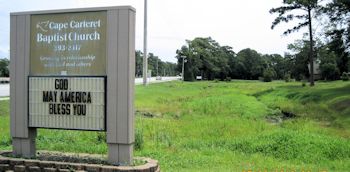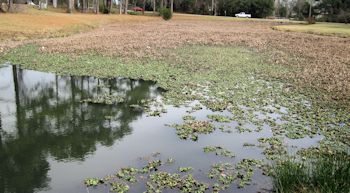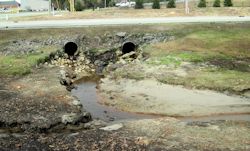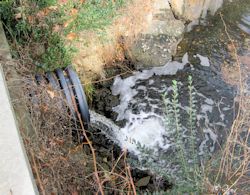 The larger of the ponds in front of Cape Carteret Baptist Church drained last year when a control valve failed. It is now covered in weeds. |
 The other pond in front of the Presbyterian Church is covered in a noxious lily that only the nutria love. |
CAPE CARTERET — The N.C. Coastal Federation expects to pay for and begin work this fall on a project to solve a vexing environmental and aesthetic problem: Turning two unsightly ponds in front of churches just off N.C. 24 in western Carteret County into wetlands to protect an imperiled creek.
Lexia Weaver, a federation coastal scientist, said Monday that the long-sought fix should cost less than $200,000 and be finished within a year.
Supporter Spotlight
And thanks to an infusion of cash, the federation will foot the bill.
The solution – which federation staffer Sam Bland presented to the Cape Carteret Board of Commissioners during its meeting Monday night – will involve digging out and re-grading the pond basins, removing existing non-native plants and converting the basins into wetlands that feature native plants, including cypress trees.
During the board meeting, Commissioner Richard Hunt said he was familiar with rain gardens, a similar concept, and asked Bland if the churches would be responsible for the maintenance. Bland said some upkeep would be necessary.
Hunt also asked if there would be a height limit on the native vegetation, and Bland said there would be none.
Commissioner Mike King asked if the ponds will still look like a ponds. No, said Bland, more like wetlands.
Supporter Spotlight
“If there are no more questions, we’re going to leave it to you and the churches,” Mayor Dave Fowler said, ending the discussion.
The board took no action Monday, but Karen Zornes, Cape Carteret town clerk, said none was needed. The town doesn’t own the land.
Cape Carteret Baptist and Presbyterian churches own the property. The Rev. Kevin Clubb, pastor of the Baptist Church, declined to comment Tuesday, saying he wanted to talk to other church members first.
The repair work is environmentally important, according to all involved. The larger pond, on the Baptist Church property, has in the past trapped stormwater runoff from the highway and nearby major parking lots and slowly released it into the neighboring pond on the Presbyterian Church property. The water then drains into Deer Creek, a shellfish stream that’s designated as Outstanding Resource Waters but has been closed to shellfishing because of bacterial pollution from stormwater. The creek flows into Bogue Sound.
 Lexia Weaver |
 Dave Fowler |
The ponds have been in unsightly disrepair for a long time.
The area also serves as a sort of scenic gateway to the town. And, Weaver and Fowler said Monday, the basins have become home to a number of nutria – large rodents, similar to beavers – that have voracious appetites and can undermine infrastructure, including highways, near their habitats.
“We’re very excited and grateful that the federation is going to do this,” said Fowler, who is a member of the federation. “It’s been a problem for some time, one that we’ve been trying to solve, but we’ve had a lot of difficulty getting to a solution.”
The money the federation will use for the work will come from the recent sale of a permanent conservation easement at North River Farms in Down East Carteret County to the U.S. Department of Agriculture. After legal and other expenses, the sale of the easement on 2,168 acres that the federation bought in 2002 will enable the organization to reinvest about $3 million in conservation projects that protect or restore water quality.
Coincidentally, the $3 million bonanza was almost exactly the price the federation paid for the property, which was its second chunk of land it bought at the farm. The whole project – one of the largest wetlands restoration projects ever in North Carolina and one of the largest in the nation – began in 1999 when the federation bought 1,991 acres at the farm for $1.07 million, with a grant from the N.C. Clean Water Management Trust Fund, which also funded the second purchase.
The federation’s goal is to recreate wetlands habitat for the entire 6,000-plus acres at the site, and to make it available for public use. Smaller-scale efforts like the one to fix the Cape Carteret ponds as a way to clean up water quality in Deer Creek fit well with the federation’s mission, said Todd Miller, the nonprofit’s executive director.
The trustees of the N.C. Clean Water Management Trust Fund in June gave the federation approval to use a portion of the proceeds from the easement to complete the retrofits of the ponds. The trustees supported the project because it would help to restore water quality in Deer Creek.
“We’re happy to help our neighbors in Cape Carteret,” said Miller, whose office is just a few miles away in Ocean. He and his sons also attended elementary school in the town.
“Those very old ponds have been an ongoing problem,” he said. “They’re unsightly and are not currently providing sufficient water-quality protection for Deer Creek. Various solutions have been discussed over the years, but nothing was ever done because no one ever had the money. We have some extra money now, and It’s good to put some of it to use helping a town that has demonstrated a willingness to protect the environment.”
 Stormwater enters the ponds through these and two other pipes. |
 The water then drains into Deer Creek. |
Cape Carteret negotiated stormwater controls that were far stricter than state standards when Lowe’s Home Improvement opened its store in town and when McDonald’s remodeled its restaurant. It also joined with neighboring Cedar Point on an ordinance to encourage low-impact development techniques.
Weaver said the longstanding problems with the ponds were exacerbated in November when a water-control structure failed at one pond and the water drained into Deer Creek.
“The town contacted us to see what could be done, and we suggested that we turn the ponds back into wetlands,” she said. “At that point we started looking into grant possibilities.”
Discussions began with the town, the churches, the state Division of Water Quality and the state Department of Transportation. Neither state agency had the money to help restore the ponds, though drainage from a state highway enters them. The Army Corps of Engineers said that the pond predated its permitting process, but a Corps permit will be needed before any work is done.
All then envisioned getting a state or federal grant to help cover the project’s costs. The town agreed to act as a fiscal agent for a grant, but would assume no financial responsibility or liability for the project itself.
That plan fell through, Weaver said, when the federation learned that the project no longer qualified for a grant because a comprehensive plan to restore the watershed had not been done.
“We thought, ‘Oh great, all this work by everyone involved, and it’s gone,’” Weaver said.
Then – just a few weeks ago – the federation closed on the sale of its easement, and the group decided to seek approval from the trust fund to use some of the money to retrofit the ponds.
“It’s ideal,” Weaver said. “Now we are under no time constraints. Instead of having to wait until next year, as we would have under the grant, we can get started right away.”
Weaver plans to meet in a couple of weeks with the town and the churches. About the only steps left, she said, are for the churches to approve the restoration designs and to provide conservation easements to ensure that the restored wetlands are protected in perpetuity.
The cypress trees and other wetlands plants should be able to take up a lot of stormwater runoff, reducing the amount of pollution that will flow into Deer Creek, said Weaver, who has helped design and implement plans for numerous wetlands projects, ranging from small rain gardens at schools and other public facilities, including the Cedar Point Town Hall, to the massive North River Farms project.
The end result, according to Fowler, should be a “win-win” that is both aesthetically pleasing and functional.
“I’ve got great confidence in the federation,” Fowler said. “I don’t believe these ponds were built for this purpose – stormwater runoff retention – but over the years they did become essential for that purpose. Now, it’s going to be taken care of in a way that should be great for everyone involved.”
He still worries about the nutria and fears they will degrade the highway shoulder. Weaver said the federation doesn’t have plans to trap and remove the animals, but she is confident they will move on once the habitat has been changed and the plants they have been eating no longer grow there.
A version of this story is also running this week in the Tideland News of Swansboro. Carteret County News-Times Staff Writer Anna Harvey contributed to this article.







